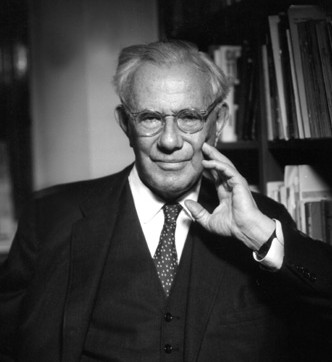August 20, 1886 - October 22, 1965
Existentialist Philosopher, Theologian and Founding Member of the Society for the Arts, Religion and Contemporary Culture
From Brandenburg, Germany
Served in Germany and the United States
Affiliation: Lutheran
"The courage to be is rooted in the God who appears when God disappears in the anxiety of doubt."
"Being religious means asking passionately the question of the meaning of our existence and being willing to receive answers, even if the answers hurt."
Paul Tillich was born 20 August 1886 in Starzeddel then a province of Brandenberg Germany (now part of Poland). His family moved to Berlin in 1900 when his father was called to a position as a Lutheran pastor. After graduating from the Friedrich Wilhelm Gymnasium in 1904 Tillich attended the universities of Berlin Tübingen and Breslau. He graduated in 1911 from the University of Breslau with a doctoral degree in philosophy.
In 1912 Tillich was ordained as a minister in the Lutheran Church. For the next two decades he lectured on philosophy and theology at many universities including Berlin Dresden and Frankfurt. He also spent four years serving as a military chaplain during World War I. His philosophical and theological views developed as he gained exposure to varied academic environments from the neo-orthodoxy of Karl Barth to the existentialism of Heidegger. His liberalism and opposition to the Nazi movement led to his dismissal in 1933. Fortunately Reinhold Niebuhr whom he had met in Germany offered him a position at the Union Theological Seminary in New York. Tillich became a U.S. citizen in 1940 then took up a position at Harvard in 1954 followed by one at the University of Chicago in 1962 where he was to remain until the end of his life.
Though in many ways unorthodox and reformist Tillich was undoubtedly a Christian theologian. His concern was to develop a satisfying Christian theology in the context of an acceptable philosophy. Heideggers influence can be seen in Tillichs existential starting-point in his ontology of beings and being itself. He uses the existentialist motif of nothingness in his characterisation of the experience of beings as confronting the nonbeing inherent in our finitude. He opposed himself to any understanding of God that might give the impression of deity as a being among others; God in Tillichs view had to be understood as the ground of being or to use a not-unfamiliar expression being itself. The manner in which he spoke of God with such remarks as God does not exist. . . . He is being itself beyond essence and existence led to some accusations of atheism and pantheism.
Tillichs best-known work is his three-volume Systematic Theology (1951 1957 and 1963) which was based on his Gifford Lectures. His work clearly has an apologetic approach. He characterised theology as the methodical interpretation of the contents of the Christian faith. That is the Christian faith had to be interpreted and could only be interpreted by reason. Following Aquinas Tillich sought to show how revelation could be reconciled with reason since in the end there could be no insurmountable conflict between the two. His understanding of religion emphasised the importance of symbolism and he held that reason played the role of interpreting revelation through true symbols. True symbols were for Tillich an expression of the infinite through the finite. The implications for his Christology were certainly unorthodox significantly in his view that Christ could not be identified with God in any literal sense but rather a symbolic revelation from God of what humanity ought to be. Tillichs work also attracted interest and exerted influence beyond theological readership most notably in his work on existentialism as expressed in The Courage to Be published in 1952.
Tillich died in Chicago in 1965. A park was named after him in New Harmony Indiana where his ashes were interred.
Works by Paul Tillich include The Protestant Era (1948) Systematic Theology 3 vols. (1951 1957 1963) The Courage to Be (1952) and The Dynamics of Faith (1957).
This is not our work. It can be found here





